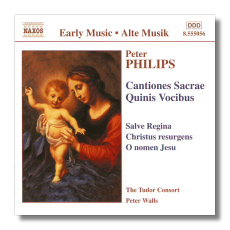
The Internet's Premier Classical Music Source
Related Links
- Philips Reviews
- Latest Reviews
- More Reviews
-
By Composer
-
Collections
DVD & Blu-ray
Books
Concert Reviews
Articles/Interviews
Software
Audio
Search Amazon
Recommended Links
Site News
 CD Review
CD Review
Peter Philips

Cantiones Sacrae, Quinis Vocibus
- Salve regina, mater misericordia
- Hodie beata virgo Maria
- Alma redemptoris mater
- Iste est Iohannes
- O nomen Jesu
- Ave Maria gratia plena
- Cantabant sancti
- Stella, quam viderant magi
- Mulieres sedentes
- Surgens Jesus
- Christus resurgens ex mortuis
- Conceptio tua
- Gaude Maria virgo
- Tibi laus, tibi gloria
- Salve salutaris victima
- O Maria mater et Joannes
The Tudor Consort/Peter Walls
Naxos 8.555056 70:12
Here is truly beautiful singing. Vivid, packed with emotion, taut and persuasively articulated. The Tudor Consort under Peter Walls have done the unjustly-neglected Philips proud.
Like William Byrd, Peter Philips (1561-1628) was a Roman Catholic at a time when the strictures of Elizabeth I's Church Settlement did not officially tolerate Catholicism. He has much of Byrd's sophistication and his passion, most of Byrd's confidence; and all of his conviction.
Unlike Byrd, whose recusancy is usually assumed to have been tolerated thanks to his exceptional talent, Philips fled to mainland Europe at the age of 21. First to the English College at Douai in the Spanish Low Countries. Then to the English College in Rome, at a time when Palestrina was at the height of his powers. Finally, after traveling in western Europe, Philips settled in the household of Archduke Albert, the regent of the Spanish Netherlands; it was in Antwerp in 1612 that the five-part 'Cantiones Sacrae' – a collection from which forms this recording – were published.
So although written at the time of Monteverdi's Vespers, Philips' motets show none of the 'stile moderno'. What's more, his adherence to the practice of setting strictly liturgical texts for the church year (rather than, say, freely-chosen psalm settings as his Protestant counterparts in England were doing) can be taken as a doughty affirmation of his Counter-Reformation faith. Indeed Philips' dedication of this music is to the Virgin Mary.
The Tudor Consort and Walls convey this fervor, yet entirely managed ardor from the first note to the last. Not in clenched-teeth fashion; but through obvious familiarity with the music. Nothing drags, even the more lugubrious passages (for example the 'Salve Regina', 'Salve, salutaris Victima' or 'Cantabant Sancti', which are very English in spirit – and redolent of Taverner) do not languish. In fact at times the performances may be just a little too pacey.
Listeners will be struck by how well these forces approach the unashamed word-painting of many of these pieces. The temptation is to draw attention to it. Instead, The Tudor Consort, a nearly two-dozen strong New Zealand ensemble, works as a unit and lets the punctuation, vocal runs and changes in tempo reinforce the words. They are recorded well (in the Erskine Chapel, NZ – built in 1930) though perhaps not with total clarity: the acoustic is oddly dry but compensated for by The Tudor Consort's clear and enthusiastic articulation.
Philips' music is not an eccentricity; nor does it belong in the backwater of Elizabethan and Jacobean footnotery. It is lovely, sinuous yet sinewy music; its themes are carefully and expertly developed and the composer's distribution of material across the voices is a delight. The selection on this disk is varied and has highlights: the Mulieres sedentes (tr 14) is heartbreakingly poignant, for example. There are few other CDs devoted exclusively to Philips – except for a handful surveying his harpsichord music, which is equally compelling – so if you love late renaissance choral polyphony, albeit both conservative in style and dissident in origin, don't hesitate to buy this sumptuous CD.
Copyright © 2007, Mark Sealey




















